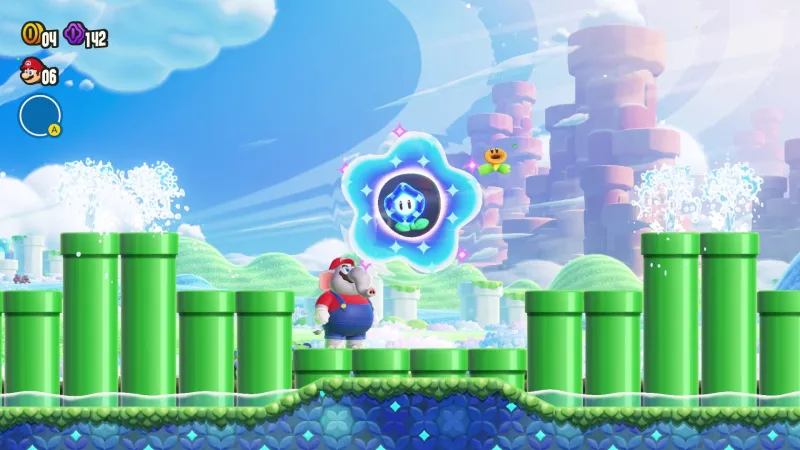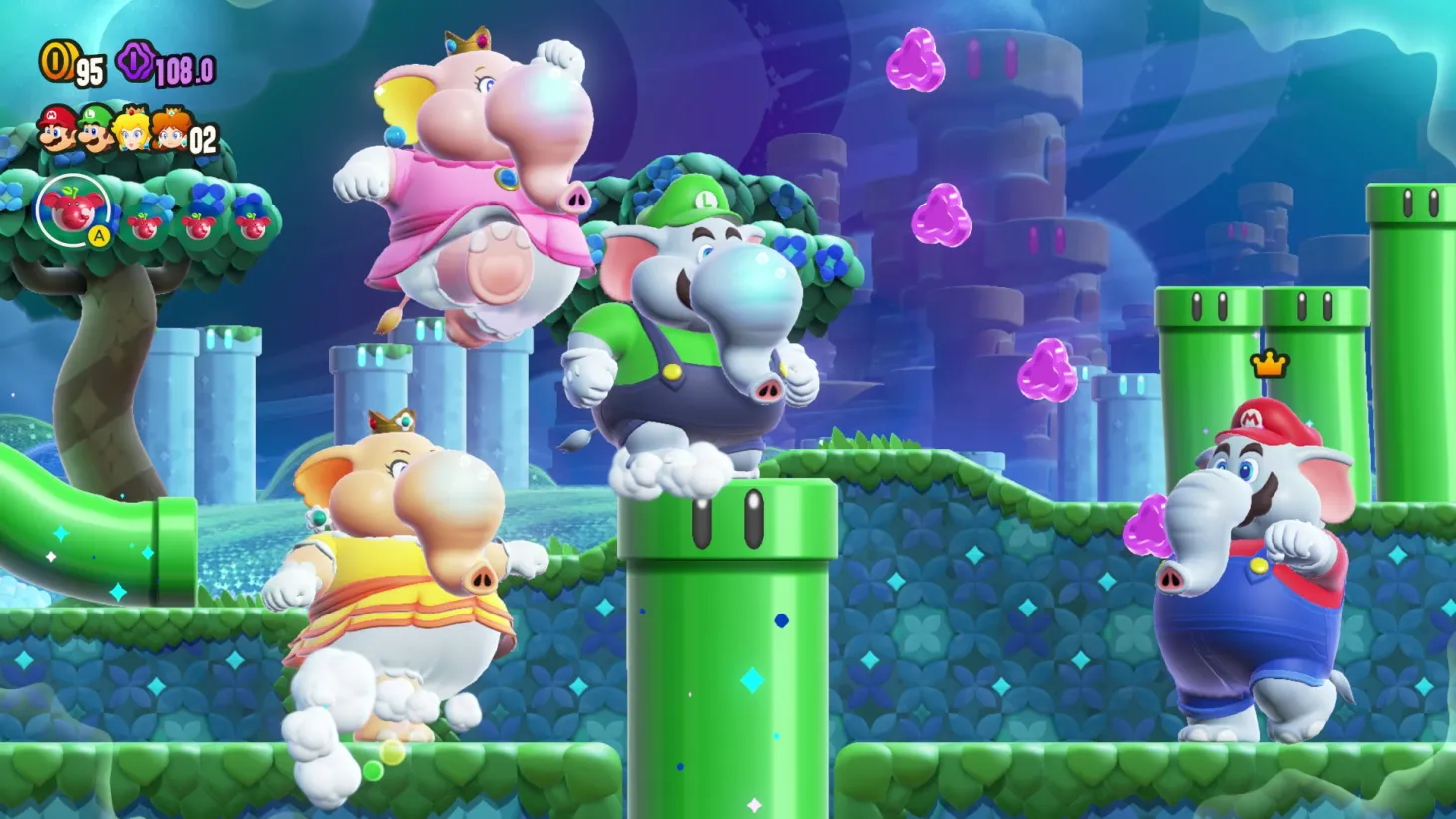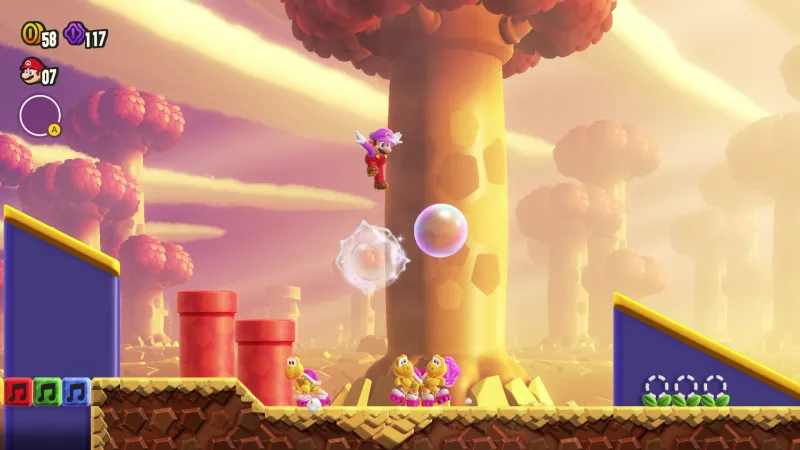


The June 2023 reveal of Super Mario Bros. Wonder was met with many excited reactions; the art direction, the music, and the new enemies all looked like fun evolutions of what fans had grown accustomed to in the New Super Mario Bros. series. However, it was the final shot of the trailer that garnered the biggest reaction, as Mario grabbed an odd-looking fruit and turned into a massive elephant version of himself. Elephant Mario, who appears larger than life on our current cover art, quickly became one of the most recognizable elements of Super Mario Bros. Wonder.
Players won't need to wait long to play as Elephant Mario, as it appears in the very first stage, Welcome to the Flower Kingdom. The Elephant Fruit emerges out of a block, and true to the trailer, Mario transforms into this new form. Though not unexpected since I've seen that reveal trailer more times than I can count, it's still somewhat jarring to watch one of the most iconic characters in pop culture undergo such a different transformation. In this form, Mario can swing his trunk to attack enemies and break bricks from the side, but he can also spray water to cause reactions like those seen in special flowers called Wow Buds that bloom and reward previously unseen items and collectibles.

As director Shiro Mouri explains, Elephant Mario was born out of the desire of wanting to achieve a particular moveset but also deliver a new version of something Mario has been doing since the very first Super Mario Bros. game: becoming bigger. "When we're talking about creating power-up items or power-up transformations, the first thing we start with is the gameplay experience: What kind of gameplay experience do we want to provide the player with?" he says. "The first thing we wanted to do was make Mario's body bigger. The reason we wanted his body bigger was so that it makes it easier when you're hitting blocks, it makes it easier to stomp enemies, and it makes it easier to grab coins. We thought that changing the fundamental mechanics of Mario could be a refreshing gameplay experience. Another example, but not as flashy, is that when you have a narrower platform when you have a bigger body, it's just easier to land on. If you're small, it's easy to miss that."
Many theoretical forms could provide the goal of making Mario bigger – after all, Super Mushrooms have been doing that for decades – but once the team looked at the other gameplay goals it had for a power-up item in Super Mario Bros. Wonder, the choice became clear. "The second point we wanted to do was be able to hit blocks from the side. If you're able to hit blocks from the side, it provides you with areas where you can only access through that transformation. And the third thing we wanted to do was spray water. The reason we wanted to do that was, for example, let's say there's a withered flower. By watering it and having it bloom, something mysterious might happen. [...] To come up with a transformation that really fits with these three ideas of making the body big, being able to hit blocks on the side, and then spraying water, after a lot of consideration, really, the only answer was an elephant."
When characters turn into their Elephant forms, they undergo a drastic visual transformation, but they retain enough parts of their character design that they are still easily recognizable. According to art director Masanobu Sato, that was one of the initiatives he and his team took on when creating these Elephant forms. "We start by understanding the characters and their iconic features," he says. "For example, Mario's key color is red, and he has a large nose and a distinguished mustache. The design process starts with applying the transformation motif to a character while maintaining a balance to make sure that a character's iconic features are not lost."

The creation of Elephant Mario seems straightforward in the way it fulfills various gameplay goals, but another prominent power-up in Super Mario Bros. Wonder, the Bubble Flower, was inspired by a completely different source: improving upon the past. "In New Super Mario Bros. U, there was the [Bubble Baby Yoshi]," Mouri says. "Part of the mechanics of that character was that you had to keep the Y button held down to be able to use it, and we thought that was something that could use a little improvement. As an extension of trying to improve that feature, we came up with the idea of the Bubble Flower and then ultimately, Bubble Mario. I think because the Bubble Flower allows you to A, defeat enemies, and B, also create platforms that you can jump off of, it's become a pretty interesting and appealing power-up."
In addition to the Elephant Fruit and Bubble Flower, players can also use other new power-ups ranging from other all-new items like the Drill Mushroom (learn more about that one here) and the classics like the Super Mushroom, Super Star, and Fire Flower. And of course, there's the strong likelihood that Nintendo hasn't shown us all the power-ups we'll be enjoying when Super Mario Bros. Wonder comes to Switch on October 20.
For more on Super Mario Bros. Wonder, be sure to click the banner below to visit our exclusive coverage hub, or head here to read about our hands-on impressions.